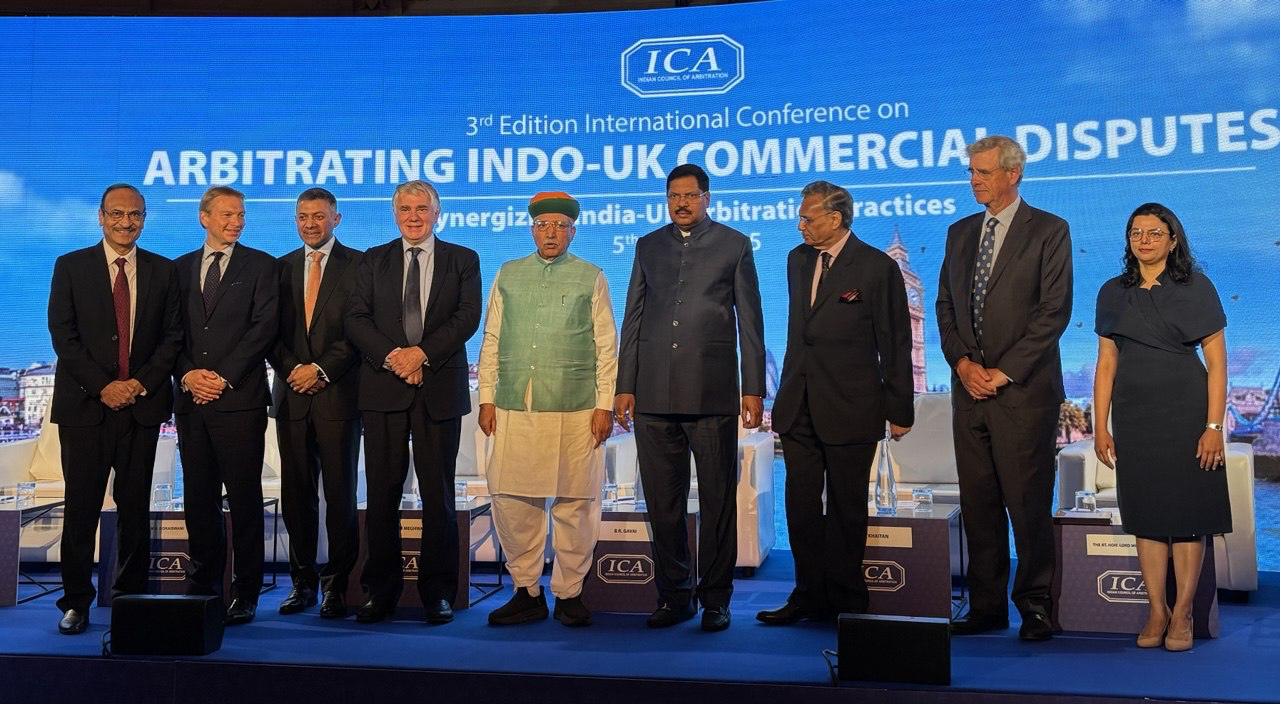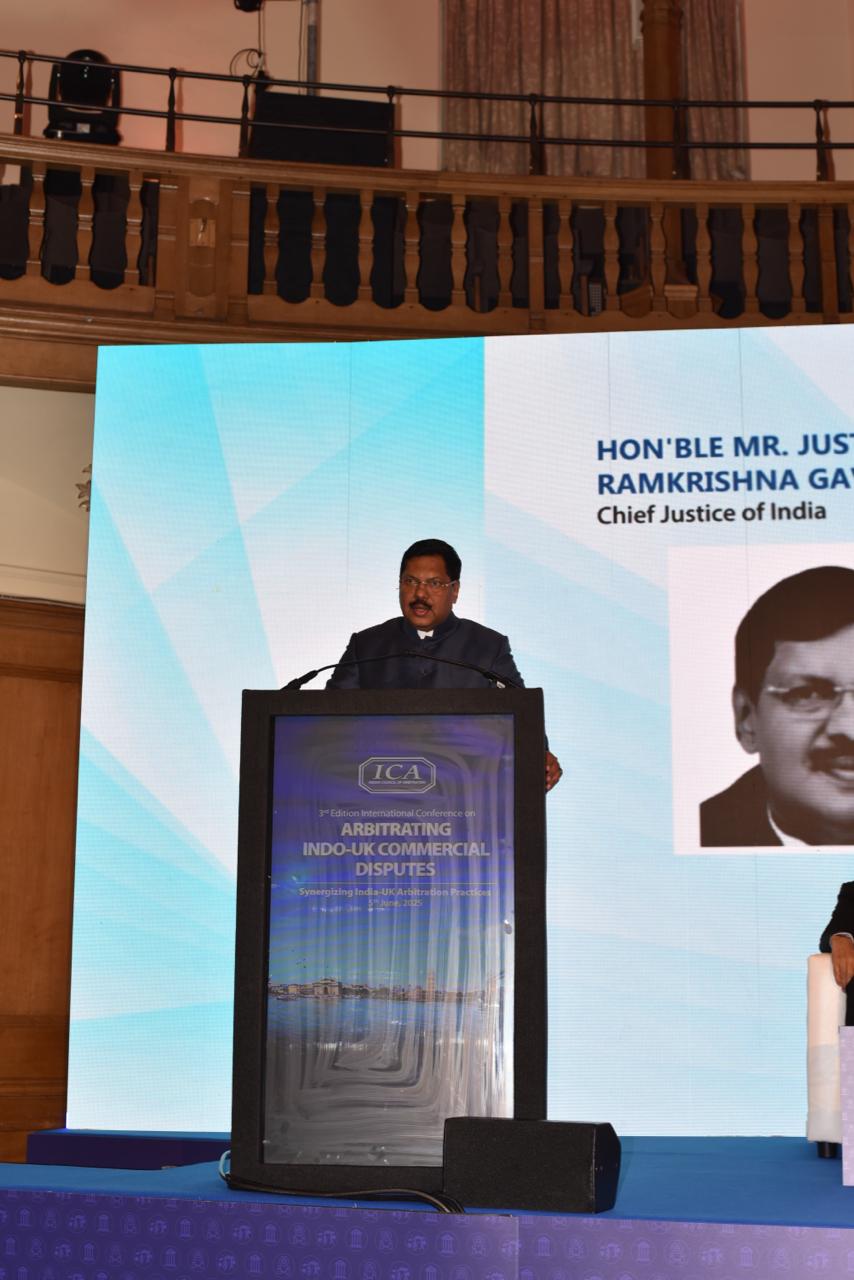Organised by the Indian Council of Arbitration (ICA), the event brought together esteemed judges, policymakers, legal professionals, and commercial arbitration experts to deliberate on cross-border dispute resolution. With a sharp focus on deepening Indo-UK commercial ties through arbitration, the day saw invigorating discussions and landmark addresses that underscored shared democratic values and the evolving role of law in fostering international commerce.

Chief Justice of India B.R. Gavai inaugurated the conference, highlighting the importance of arbitration as a tool to ensure access to timely and effective dispute resolution in the increasingly globalised business landscape.
“Disputes are an inevitable part of the process. What truly matters is our capacity and commitment to resolving them efficiently and effectively. The manner in which we address and settle conflicts is what defines the strength and resilience of our commercial relationship.”
-Justice Gavai

In his address, the Justice Gavai traced the evolution of arbitration in India, emphasised shared legal traditions with the United Kingdom, and underscored the importance of creating a robust, efficient and mutually reinforcing arbitration ecosystem.
Historic Roots and Shared Legal Ethos
Justice Gavai reflected on the deep civilisational and legal ties between the two nations:
“India and the United Kingdom share a rich history, bound by the tradition of arbitration and mediation — rooted in our common law heritage.”
He invoked Mahatma Gandhi’s legacy, noting his commitment to resolving disputes through mediation, and linked this philosophy to India’s modern arbitration journey.
Legislative Reforms in India and the UK
Addressing the ongoing legal evolution in both jurisdictions, the CJI remarked:
“India has continuously aspired to become a hub of international arbitration by building a progressive legislative framework, a pro-reformist judiciary, and robust institutional support.”
He highlighted the significance of amendments to the Arbitration and Conciliation Act, 1996 — particularly the 2019. He also reflected on the establishment of the Arbitration Council of India, and the 2024 Bill proposing the codification of emergency arbitration and appellate tribunals.
Comparatively, he welcomed the 2025 amendment to the Arbitration Act, 1996 (UK), enabling summary disposal of weak claims and clarifying the governing law of arbitration agreements — signalling a “shared commitment to fostering a conducive environment for arbitration.”
Judicial Developments: Upholding Finality and Autonomy
Drawing from precedent, Justice Gavai pointed to pivotal Indian decisions reinforcing minimal judicial interference:
“The finality of an arbitral award is the most crucial aspect in international commercial arbitration……”
Cases such as Bharat Aluminium Co. v. Kaiser Aluminium Technical Services Inc., (2016) 4 SCC 126, Vijay Karia v. Prysmian Cavi E Sistemi SRL, (2020) 11 SCC 1, Gayatri Balasamy v. ISG Novasoft Technologies Ltd., 2025 SCC OnLine SC 986 and Amazon.Com NV Investment Holdings LLC v. Future Retail Ltd., (2022) 1 SCC 209 were cited to illustrate India’s jurisprudential maturity in respecting party autonomy, enforcement of foreign awards, and curbing excessive intervention.
He remarked, “When the likelihood of an arbitral award being set aside or modified is minimised, confidence in arbitration increases, leading to a more stable and predictable business environment.”
Institutional Growth and Bilateral Collaboration
Justice Gavai lauded the establishment of institutions like the Delhi International Arbitration Centre (DIAC), Mumbai Centre for International Arbitration (MCIA), and the India International Arbitration Centre (IIAC). He said- these centres have played a key role in administering disputes outside the judicial setup.
He also acknowledged the contribution of the London Court of International Arbitration (LCIA) as a model of excellence, while noting the need for continued collaboration and learning.
Innovation and the Way Forward
The Chief Justice welcomed developments like hybrid dispute resolution mechanisms, online dispute resolution (ODR), and India’s embrace of technology to bridge physical distances. These online systems have made physical distances irrelevant, he noted, referencing India’s adoption of virtual arbitration and hybrid dispute resolution systems.
He noted:
“Hybrid mechanisms such as Arb-Med-Arb have the potential to reduce the perceived disadvantages of standalone arbitration and mediation.”
The recent Bar Council of India’s rules allowing foreign lawyers and firms to advise on arbitration in India was termed a “landmark reform” that will align Indian arbitration with global best practices without compromising local legal sovereignty.
Justice Gavai concluded by affirming India’s commitment to fostering an enabling environment for international arbitration:
“As the business and legal communities in India and the UK grow increasingly interconnected, this strong camaraderie is well-positioned to foster the expansion of the arbitration ecosystem in both countries.”
With a firm resolve to make India a preferred seat of arbitration, the CJI’s address set the tone for a conference centered on cross-border collaboration, legal innovation, and harmonisation of dispute resolution practices between the two commercial giants.


